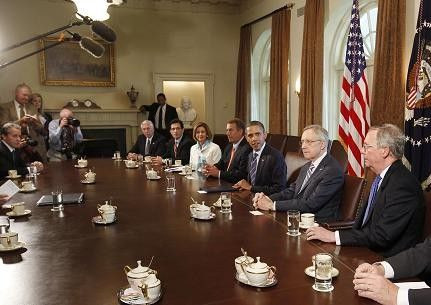Senate Vote on Debt Deal May Occur Sunday
Analysis

Write the day down: Sunday, July 31, 2011 -- it's one that may be known henceforth as "Debt Deal Day" in the United States.
On Saturday, as the nation approached a credit market-constraining, economic growth-slowing U.S. default, the White House and Congressional lawmakers broke their stalemate and formulated a debt deal outline, or framework, senior Congressional officials said Sunday.
If approved -- and that's a big "if" -- the deal would represent the biggest fiscal achievement for Washington in the past 30 years: the deal would avert a dreaded U.S. government default, and telegraph to U.S. taxpayers and foreign leaders alike that the United States has taken the first major step toward balancing its budget.
Long-term major spending -- including entitlement reform -- and revenue issues still must be resolved, but the debt deal framework, if approved, would signal to the international community that the United States has the political will to make the tough choices needed to live within its means.
What's more, President Barack Obama would get his "grand bargain" deal, of sorts, with at least $2.4 trillion in federal spending cuts, and a debt ceiling increase large enough to last through the 2012 election. Obama said he wanted a larger debt deal and debt ceiling because he did not want the nation and the commercial/financial markets to go through another divisive period of "debt ceiling uncertainty" -- something that has prevented business executives from implemented expansion and hiring plans.
Debt Deal Items
The tentative deal's major points, as reported by ABCNews.com:
-A debt ceiling increase of up to $2.1 to $2.4 trillion (depending on the size of the spending cuts agreed to in the final deal).
-Agreed-to spending cuts of roughly $1.2 trillion over 10 years.
-The formation of a special Congressional committee to recommend further deficit reduction of up to $1.6 trillion (whatever it takes to add up to the total of the debt ceiling increase). This deficit reduction could take the form of spending cuts, tax increases or both.
-The special committee, comprised of six Democrats and six Republicans, must make recommendations by late November (before Congress' Thanksgiving recess).
-If Congress does not approve those cuts by December 23, automatic across-the-board cuts go into effect, including cuts to Defense and Medicare. This "trigger" is designed to force action on the deficit reduction committee's recommendations by making the alternative painful to both Democrats and Republicans.
-A vote, in both the House and Senate, on a balanced budget amendment.
Senate Minority Leader Mitch McConnell, R-Ky., told CNN Sunday upfront spending cuts would amount to about $1 trillion, and there are no tax increases.
Word of the substantive talks between the White House and Congressional Democrats and Republicans prompted Senate Majority Leader Harry Reid, D-Nev., to delay his planned vote to end a GOP filibuster until 1 p.m., with Reid saying he wanted to allow more time for negotiations underway at the White House.
There are "many elements to be finalized" and still "a distance to go," Reid said, CNN reported. "We should give everyone as much room as possible to do their work."
Meanwhile, Sen. Charles Schumer, D-N.Y. and as good a vote-counter and pulse-taker as there is inside the beltway, underscored that "there is no final agreement," but that "default is far less of a possibility now than it was even a day ago," wsj.com reported Sunday.
Political/Public Policy Analysis: Without question, Democrats and Republicans are getting close. The cynic would say both parties should have reached this point in the talks six months or even a year ago, but the stance here is "absolutely, better late than never" and we're emphasizing the positive.
If the framework becomes law -- and that's a big 'if' because is in the modern era more than one major bill has died an unexpected death in the Senate -- it would be the United States' biggest budget achievement since the President Clinton's Omnibus Budget Reconciliation Act of 1993 that included a tax increase that helped balance the federal budget.
To be sure, the current deal framework includes no tax increases, and that's one win for the Republican Party and its very conservative Tea Party faction. The GOP also gets spending cuts at least as large as the debt ceiling increase.
The Democratic wins include no battle over the borrowing limit until after the 2013 elections, and a bipartisan committee to take a hard look at the nation's defense spending and commitments.
Again, paraphrasing Schumer, no one should celebrate yet: nothing is agreed to, until everything has been agreed to.
That said, based on the ongoing substantive talks and the positive momentum building Sunday, we're lowering the risk barometer, on a scale of 0 to 100 percent, of the likelihood of a U.S. Government default, to 25 percent on Sunday at mid-day, 10 percentage points lower than Saturday night.
© Copyright IBTimes 2024. All rights reserved.





















